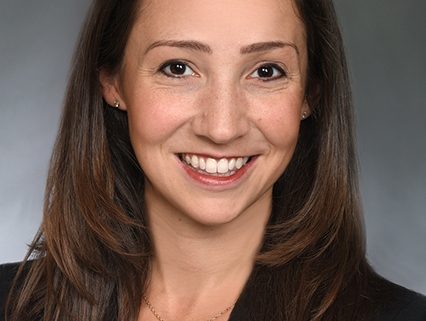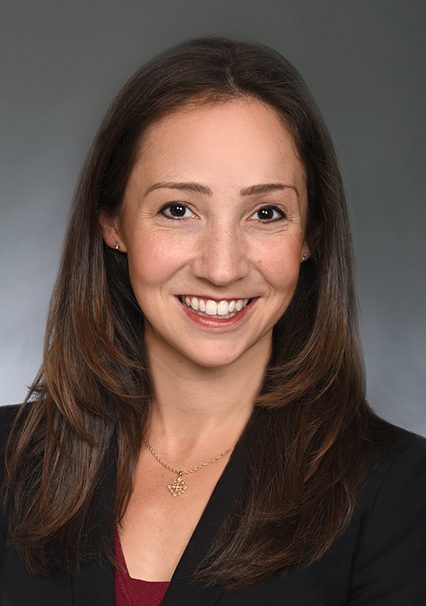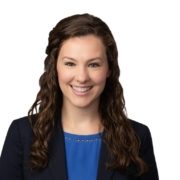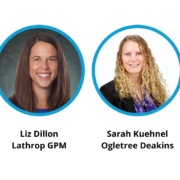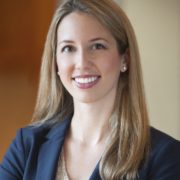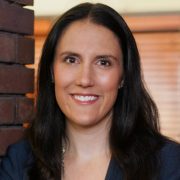Spotlight on Flex – Kelsey Morris
The Spotlight on Flex showcases professionals from member organizations who exemplify personal and professional success while working a flexible schedule. Their stories illustrate the long-term benefits that flexible schedules offer to both individuals and organizations.
For July 2018, we are pleased to share insights from Kelsey Morris, Associate, Akin Gump Strauss Hauer & Feld (Irvine, CA)
Diversity & Flexibility Alliance: How have you made flexibility a priority and a success through your schedule?
Kelsey Morris: Right after law school, I started at Akin Gump’s LA office, and I was there from 2011-2015. I left to complete a one year, federal clerkship with the US District Court for the Central District of California. My daughter was born right at the end of my clerkship in 2016. At this point, I was at a crossroads in my career – I knew I wanted to continue practicing and spend the most time I could with my daughter while she was young. I just didn’t see a path forward at big law that would meet those needs at the time. I decided to start teaching legal writing at USC law school and took on projects as an independent contractor to keep up my legal practice. I was doing this for about five months when a former colleague from Akin Gump called and asked if I would join the litigation practice in the firm’s Irvine, CA office. My daughter was almost a year old, and I had a clearer vision of how I wanted to practice law and how much time I wanted to be available for my family versus work. I knew I wanted to come back and how I wanted to come back.
Akin Gump, and particularly the partners in Irvine, graciously worked with me to find the right arrangement. This year, I am working at a 60% reduced hours schedule and come into the office at least three days a week. It may not be a traditional schedule, but I make sure I’m fully present when I’m here, and I’m logged in and available remotely the rest of the week.
My flex success doesn’t just originate with me – without the practical support and understanding of my colleagues in Irvine, this wouldn’t work. For my part, though, I think success comes from mentally committing to my schedule. I was fortunate to have worked for senior women who were on flex schedules when I first started at the firm, and they were open with me about what flex looked like for them. I learned that for the sake of yourself and your work, you have to commit to your flex schedule – whatever that may look like. Someone on a 60% reduced hours schedule can’t take on the same case load as someone working at 100% and then still only work 60%. It doesn’t work that way. You have to communicate your schedule from the beginning and mentally note that you took a pay cut for the reduced hours. When you take on too much, you’re doing a disservice to yourself, the firm, and your clients. You also confuse your colleagues because they won’t know how much work they can and should be giving you. When you make a commitment to flex, you make it fairer for everybody.
Even though I’m committed to my flexibility, I’m not so rigid with it that I end up sacrificing other things as a consequence. You have to be conscious of your clients and colleagues’ needs, and you have to prioritize those as much as possible. I utilize our available technology, and it allows for accessibility both ways.
Part of my flex success also means being patient with other people and respectful of their time commitments too. I try to make my personal schedule something that’s just running in the background – it doesn’t and shouldn’t impact day-to-day matters. Most importantly though, I try to enjoy my flexibility. I’m proud of what I’ve accomplished at the firm and how I’ve done it. Akin Gump gave me the options to make it work. You don’t want to ever feel like flexibility is a burden or feel ashamed about it, especially when the firm offers and supports it!
DFA: How have the firm and clients contributed to your flex success? How has flexibility contributed to your business development and sustainability of working at a firm?
KM: Akin Gump shows support by making its flex options known. A lot of firms don’t even offer flexible work. Flex can play out in different ways depending on the partners you work for or which practice group you’re in, but having a formal policy as the backbone is key. The firm also facilitates flex with the technology in place. Attorneys can be available regardless of whether they’re in the office. And helpfully, Akin Gump’s culture acknowledges the existence of life outside the office – the firm promotes a healthy approach to practicing law through flexibility.
Flex allows me to do work I enjoy in a sustainable way. I couldn’t envision myself coming back to work as a big law litigator while my daughter was so young. Flex makes it possible. Flex also promotes more careful and deliberate career development; it challenges you to be thoughtful about your next steps.
DFA: Looking back, what would you tell your first year associate self? Would you do anything differently?
KM: I would have had more conversations about alternative career paths and flexibility earlier in my career. I was not proactive about seeking that out, but thankfully I had people who were proactive about sharing their experiences. For a new attorney, it’s good to start looking at options early, and find role models you want to emulate later in your career.
DFA: How do you pay it forward, and how do you recharge your batteries?
KM: I’m not an extrovert; I tend to be shy. But I make it a personal policy to always say “yes” when a younger attorney or law student wants to talk. My alma mater, Pepperdine, has a robust alumni network, and students are encouraged to outreach to alumni. Whenever I receive those requests, I really try to make time, even if it ends up just being a quick phone call – that’s always doable. There are so many people in my life that were willing to share their time and meet me, go to lunch, or have a phone call; their advice has been invaluable. Those shared experiences were such a huge impact on my life, and I strive to be as open and transparent with my experiences too.
I recharge by sleeping and exercise – two basic human functions that we tend to forget about. I also love spending time with my family, and my flex schedule gives me that opportunity. Moments with my daughter make me feel so much more balanced and empowered to keep going and do really good work; I know my family is there, and I’ll see them. That’s a big deal!
If you are a professional working a flexible schedule and would like to share your story in an upcoming Spotlight on Flex, contact Eliza Musallam.

